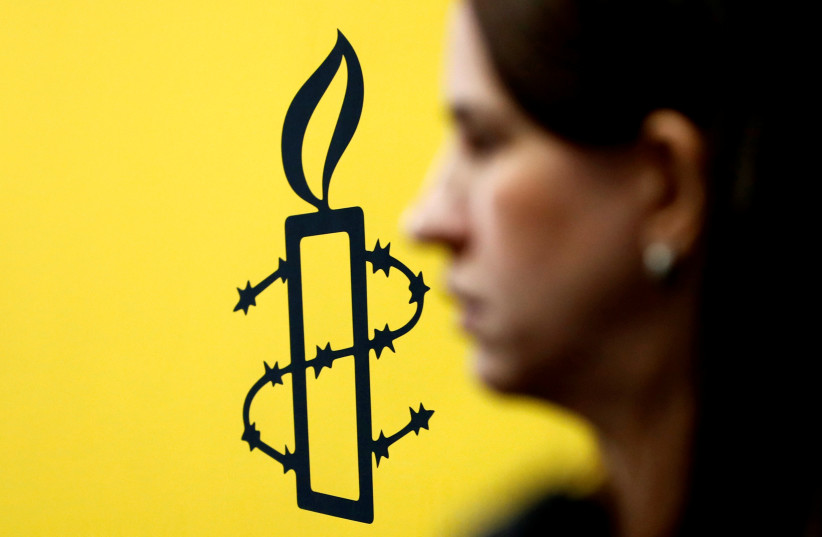The United States led initiative to boot Russia from the UN’s Human Rights Council (UNHRC) is an important symbolic, moral and political step, with a reasonable chance of success. But this will not reverse the carnage and brutality in Ukraine, nor deter President Vladimir Putin and the Russian military from more massacres. Showing Moscow the door in Geneva is also unlikely to convince the leaders of China, Iran, Syria or North Korea, among others, from killing opponents or committing war crimes.
Instead, the US should be leading a complete overhaul of the UN’s human rights structure, operations and agendas, from the bottom up. In the process, the hypocrisy protecting the UNHRC, the dictatorships, and an allied network of powerful nongovernmental organizations (NGOs) would be exposed for all to see. The myth of legitimacy and moral influence that they cultivate is based on the 1948 Universal Declaration of Human Rights and the Genocide Convention, adopted in the shadow of the Holocaust. Over the years, this moral framework has been eroded and erased by the cynical manipulation of slogans and propaganda.
The worst violators are dictators like Putin and Chinese President Xi Jinping, who use their presence on the HRC to co-opt the mechanism, while protecting themselves and their allies from investigation and criticism. Membership is based on elections held by the UN General Assembly through five regional groupings – a structure that allows powerful autocrats, as well major voting blocs including the 56 member Organization of Islamic Cooperation, to control the process. The anti-democratic countries and the OIC select compliant commissioners, oversee key staff appointments, direct the agenda and make sure that the steady flow of resolutions, investigations and expert reports avoid damaging their political interests and priorities.
The obsessive focus on Israel is a particularly effective and damaging strategy to control the activities of the Council. Already in the 1960s, the Soviet bloc, the Arab League, and the Islamic countries used international human rights frameworks to promote antisemitism. In 1975, this coalition led the adoption of the infamous “Zionism is racism” resolution – which, after the demise of the USSR, was relaunched in the UN-sponsored 2001 Durban conference on racism.
Twenty years later, the same themes are repeated in NGO campaigns by Human Rights Watch and Amnesty International that exploit the apartheid label and lobby the International Criminal Court to investigate Israel. Already in 2009, Robert Bernstein, HRW’s founder, publicly condemned his own organization, led by Kenneth Roth from 1993, for abandoning its original mission “to pry open closed societies, advocate basic freedoms and support dissenters” and instead, focus on attacking democracies, and turning Israel into a pariah state. As long as international frameworks are busy bashing Israel, there are less resources for dealing with the real violations and war crimes, as in Ukraine.

In order to end this cynical manipulation, the entire structure of the HRC will need to be overhauled and redrawn, beginning with the election process in the General Assembly. Disbarring Russia would be a significant step in the right direction, but cannot be an end in itself or allow for a return to business as usual in the absurd world of human rights.
In examining strategies towards this objective, it is useful to recall the failed reform efforts in 2006 for the Commission on Human Rights (as it was then known), led by the US government, including the adoption of criteria for membership in order to end this manipulative process. The reform would also have made it far more difficult for the coalition of dictatorships to control the agenda and appointments in the new council, and would have abolished the discriminatory permanent agenda item 7, which focuses uniquely on allegations and accusations targeting Israel.
The attempt was defeated in part by opposition of the dictatorships and OIC, the passivity of European democracies, as well as a concerted media counterattack by HRW’s Roth. In response, the US withdrew its participation in the UNHRC, but returned, first under the former president Barack Obama administration and again under President Joe Biden.
To succeed this time, the US and any allied governments that can be persuaded to join should be prepared to hold up funding until the changes are implemented. Without this stick, the talk of reform is just talk, but when the allocations stop flowing, the HRC will come to a standstill; to resume operations, hold sessions, and write reports, the UN will need to accept major and long overdue changes.
Last year, when US Secretary of State Antony Blinken announced that the US was resuming its participation on the council, he declared that it “is a flawed body, in need of reform to its agenda, membership and focus, including its disproportionate focus on Israel.” So far, these words have not been backed by deeds – the recently concluded session was as bad as or worse than its predecessors. If, beyond revoking Russia’s membership on the Council, the US leads a sweeping reform process that refocuses resources on tyrants and real human rights violators, this will be a major accomplishment.
The writer is emeritus professor of political science at Bar-Ilan University and heads the Institute for NGO Research in Jerusalem.
